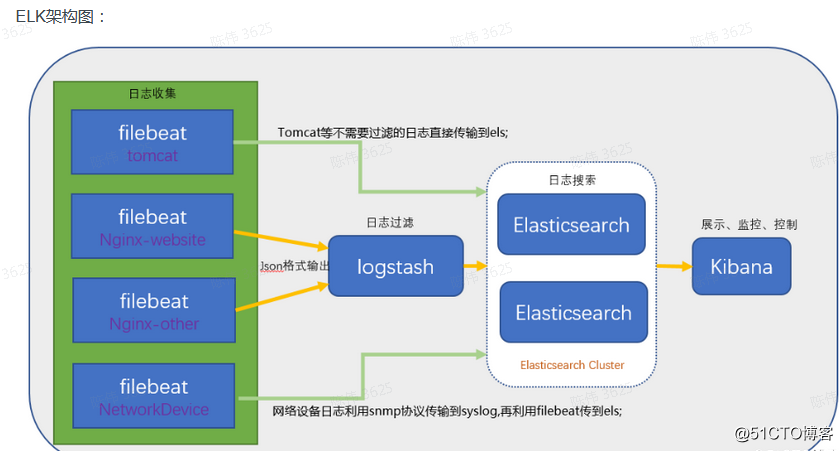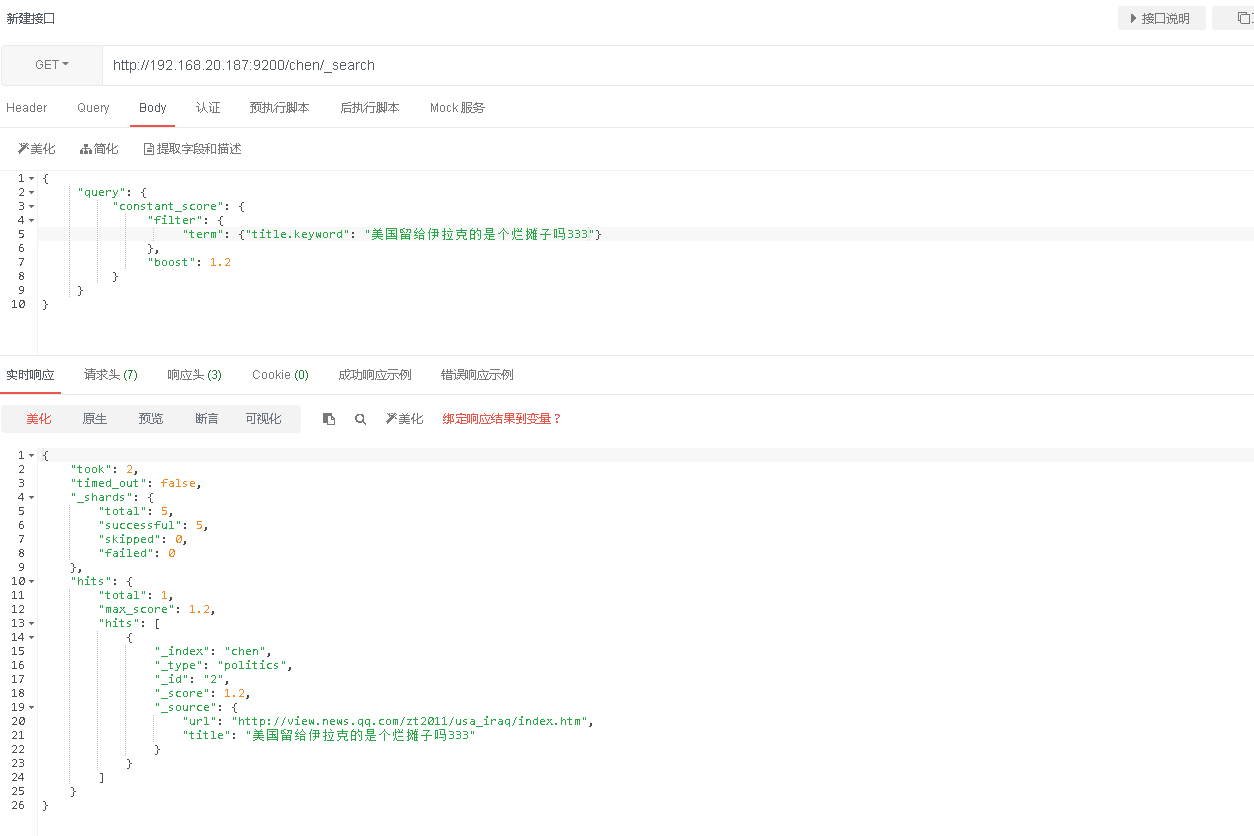概述:
ELK是Elasticsearch(简称es)、Logstash、Kibana的简称,这三者是核心套件,但并非全部。
Filebeat 日志采集工具 Logstash数据处理引擎 elasticsearch数据的存储,并作权威的检索 kibana从 elasticsearch数据库读取并展示
结构图:

备注:
也可通过python把日志传到Elasticsearch,Kibana再展示数据
我目前就是python+Elasticsearch+Kibana
语法案例:
Elasticsearch-head 语法:
################################################API查询篇####################################################################### 1.bool 查询 bool 查询可以把任意多个简单的查询组合在一起,使用 must、should、must_not、filter 选项来表示简单查询之间的逻辑。 (1) must: 文档必须匹配must选项下的从查询条件,相当于逻辑运算的 AND。 (2) should: 文档可以匹配也可以不匹配should选项下的查询条件,相当于逻辑运算的 OR。 (3) must_not: 与must相反。 (4) filter: 与must一样,只不过filter不参与评分,只起到过滤功能。 #post/GET-查询chen索引下, title等于小明123(http://192.168.20.187:9200/chen/_search) #post/GET-查询所有索引下,title等于小明123(http://192.168.20.187:9200/_search) { "query": { "bool": { "must": [ { "term": { "title.keyword": "小明123" } } ], "must_not": [], "should": [] } }, "from": 0, "size": 10, "sort": [], "aggs": {} } 2.constant_score查询 constant_score 查询可以包装一个其他类型的查询 #POST/GET-查询chen索引下, title等于小明(http://192.168.20.187:9200/chen/_search) { "query": { "constant_score": { "filter": { "term": {"title.keyword": "美国留给伊拉克的是个烂摊子吗33366666666666"} }, "boost": 1.2 } } } 3.wildcard-模糊匹配-字符串 #GET/POST-查询chen索引下, title包含 小明(http://192.168.20.187:9200/chen/_search) { "query": { "bool": { "must": [ { "wildcard": { "title.keyword": "*小明*" } } ], "must_not": [], "should": [] } } } 4.prefix-匹配开头-字符串 #POST/GET-查询chen索引下, title以'小明123'开头的内容(http://192.168.20.187:9200/chen/_search) { "query": { "prefix" : { "title.keyword" : "小明123" } } } 5.regexp-正则匹配 #POST/GET-查询chen索引下, title包含数字记录(http://192.168.20.187:9200/chen/_search) { "query": { "regexp": { "title": "[0-9]{2,10}" } } } 6.匹配汉字、数字 { "query": { "regexp": { "title": "[0-9u4e00-u9fa5]+" } } } 7.获取age包含小明,title不包含666的记录 { "query": { "bool": { "must": [ { "term": { "age.keyword": "小明" } } ], "must_not": [{ "term": { "title.keyword": "666" } }], "should": [] } } } 8.should-满足title或age任意一个即可 { "query": { "bool": { "should": [ {"term": {"title.keyword": "美国留给伊拉克的是个烂摊子吗333"}}, {"term": {"age.keyword": "66666666666666666666"}} ] } } } 9.must-同时满足title和age才查询 { "query": { "bool": { "must": [ {"term": {"title.keyword": "999955522222"}}, {"term": {"age.keyword": "66666666666666666666"}} ] } } }
#######################################################API新增篇########################################################################### ###指定id插入数据 ###PUT-http://192.168.20.187:9200/索引名/类型/自定义id { "name":"瓦力", "country":"China", "age":300, "date":"1987-3-7" } ###输入自动生成id ###post-http://192.168.20.187:9200/索引名/类型/ { "name":"瓦力", "country":"China", "age":300, "date":"1987-3-7" }
####################################################################API更新数据############################################################# #########更新数据 ###post-http://192.168.20.187:9200索引名/类型/_update { "name": "瓦力2333333333333333333" } ##也可以这样写(detect_noop默认为true) { "doc" : { "name" : "new_name" }, "detect_noop": false } ''' 默认情况下只有原来的source和新的source存在不同的字段情况下才会重建索引,如果一模一样是不会触发重建索引的,如果将detect_noop=false不管内容有没有变化都会重建索引,这一点可以通过version的值的变化来发现更新的文档,必须提前存在. ''' ######有就覆盖、没有则新增 ###post-http://192.168.20.187:9200索引名/类型/_update ##方式一: { "doc": { "address": "北京朝阳2" }, "doc_as_upsert": true } ##方式二: { "address": "北京朝阳23" }
###############################################################################API删除篇###################################################################################### ######################################################post-http://192.168.20.187:9200/索引名/类型/_delete_by_query ###通过id删除 { "query":{ "term":{ "_id":"10" } } } ###普通条件删除,age=300的数据 { "query":{ "term":{ "age":"300" } } } ###删除所有数据:(注意请求方式是Post,只删除数据,不删除表结构) ###post-http://192.168.20.187:9200/索引名/类型/_delete_by_query?pretty { "query": { "match_all": { } } }
####删除索引库(使用Delete方法) #Delete-http://192.168.20.187:9200/索引名
备注:可直接使用postman等工具查询,例如:

python3对接elasticsearch(es)
#!/usr/bin/env python # -*- coding: utf-8 -*- from elasticsearch import Elasticsearch import datetime import json ######____________________________连接es创建索引库______________________________________________________________ ###连接es es = Elasticsearch(host="192.168.20.187", port=9200) #创建dalan_test索引库(相当于创建一个表) result = es.indices.create(index='dalan_test', ignore=400) print(result) ### ignore标记成400 的意思是我们忽略状态码为400的错误 ### acknowledged字段显示True 表示索引创建成功 ###___________________________#插入数据(需要先有索引库)____________________________________________________________ data = {"name": "小美", "age": "18", "gender": "女"} #####方式一:index # ####插入数据,不传id默认自动生成 # res = es.index(index='chen', doc_type='_doc', body=data) # print(res) #####方式二:create #####create方式插入需要指定id且不能重复 # result = es.create(index='dalan_test', doc_type='_doc',id=10, body=data) # print(result) ##########################批量插入数据 ####连接es # es_client = Elasticsearch(["192.168.20.187:9200"], timeout=20) # #创建索引 # es_client.indices.create(index='test_test_test', ignore=400) # #需要插入的数据 # body1 = {"func_info":"删除日志", "error_info":"333", "write_date":datetime.datetime.now()} # body2 = {"func_info":"删除日志", "error_info":"id为空22233", "write_date":datetime.datetime.now()} # #组装数据 # #两条数据({'index': {'_index': 'log_index', '_type': 'log_index'}}...................描述) # result = [{'index': {'_index': 'test_test_test', '_type': 'log_index'}}, body1,{'index': {'_index': 'test_test_test', '_type': 'log_index'}}, body2] # #提交数据 # es_result = es_client.bulk(index="test_test_test",doc_type="log_index", body= result) # es_client.indices.flush() ###_________________________________________________查询所有数据________________________________________________________________ ###方式一: # data = es.search(index='chen') # print(data) # # ###方式二:推荐 # body = { # 'query':{ # 'match_all':{} # } # } # data = es.search(index='chen', body=body) # print(json.dumps(data)) ################################## term: 根据某个字段的值进行查询数据 ##es 官方文档: term 和 terms 是 包含(contains) 操作,而非 等值(equals) (判断) # body2 = { # "query":{ # "term":{ # "age": "66666666666666666666"} # } # } # data_list = es.search(index='chen', body=body2) # print(data_list) ###terms: 根据某个字段的多个值进行查询数据 # body3 = { # "query":{ # "terms":{ # "title": ["6662222222222222222222222","美国留给伊拉克的是个烂摊子吗"]} # } # } # age_list = es.search(index='chen', body=body3) # print(age_list) ###查询tilte字段以xxx结尾的数据 # body = { # "query": # { # "wildcard": # { # "title.keyword": "*吗333" # } # } # } # # 查询name字段以红结尾的数据 # aa=es.search(index="chen",body=body) # print(aa) ###__________________________________________________删除数据________________________________________________ ###指定id删除 # result = es.delete(index='chen', doc_type='politics', id=3) # print(result) ###根据id删除 # name = {"query":{"match":{"_id":"2"}}} # result = es.delete_by_query(index="索引名", body=name, doc_type="_doc") # print(result) ###删除索引 # res = es.indices.delete('索引名') # print(res) ###删除索引的所有数据(清空索引-保留结构) # delete_name = {"query":{"match_all":{}}} # result = es.delete_by_query(index="test_test_test", body=delete_name, doc_type="log_index") # print(result) ####______________________________________________更新数据__________________________________________________________ updateBody = { 'doc': { "title":"我这是2021-10-29后面修改的数据" } } res = es.update(index='chen', doc_type='politics', id='yMS4y3wBK5zUkjFjYOFQ', body=updateBody) print(res)
相关连接:
https://www.cnblogs.com/struggle-1216/p/12502928.html .....................................ELK+logstash结合filebeat将日志存储到redis,再由logstash转存到elasticsearch
https://blog.csdn.net/shawroad88/article/details/107337086..................................ElasticSearch, Kibana整套安装以及和python的对接,并给出部分操作案例
https://blog.csdn.net/qq_42490050/article/details/106341580 ..............聊聊redis和Elasticsearch
https://www.cnblogs.com/chong-zuo3322/p/13699008.html ...............Elasticsearch数据类型介绍
https://www.cnblogs.com/jianxuanbing/p/9410800.html .......................Docker 简单部署 ElasticSearch(部署1),,https://blog.csdn.net/shykevin/article/details/108272260 ..........docker安装kibana(部署2)(如果没有权限可以在创建容器时加 --privileged=true )
https://www.cnblogs.com/cheyunhua/p/11238489.html ......................................................................................................................快速搭建ELK日志分析系统
https://blog.csdn.net/tanqian351/article/details/83827583 ................................................................................................................搭建ELK-全过程
https://blog.csdn.net/xxy_yang/article/details/96995547 ...................................................................................................................python对接elasticsearch的用法
教程相关:
https://www.cnblogs.com/chenqionghe/p/12503181.html .........................Kibana使用教程
https://www.cnblogs.com/xuwenjin/p/8792919.html .................................elasticsearch-head的使用(elasticsearch-head是一个可视化页面可查看elasticsearch数据等相关信息)
https://blog.csdn.net/weixin_42830314/article/details/108316045............Elasticsearch-head 数据浏览无显示解决办法
https://www.cnblogs.com/yjf512/p/4897294.html,.Elasticsearch查询语句,,https://blog.csdn.net/qq_21383435/article/details/108808041 ................Elasticsearch匹配查询
https://www.cnblogs.com/liubaihui/p/11725832.html ...............................软件版本对照表
备注:1.使用elasticsearch+Kibana可以完成日志收集web展示等;
2.使用ELK+Filebeat也可以完成日志收集web展示等;
两种不同的是:1只能等客户端主动上报(对server来说是被动),2是Filebeat主动获取日志文件(对server来说可以被动也可主动)